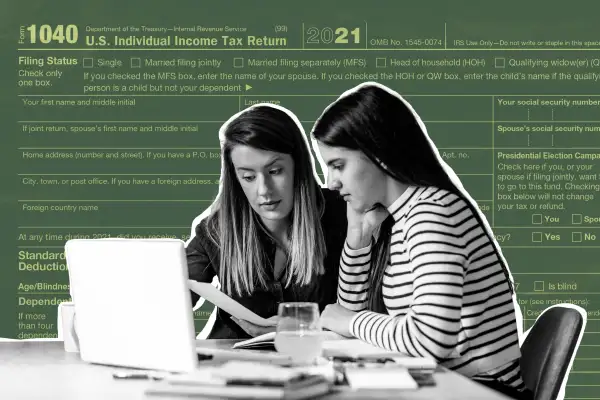Why Teenagers Should File a Tax Return — Even If It's Not Required by the IRS

Like many teenagers, Jeff Burke’s daughter has a summer job. She doesn’t legally have to file a federal tax return, because her income is too low. But her father, a financial planner in Eden Prairie, Minnesota, makes sure she files a return anyway. The potential benefits, he says, are too good to miss.
In 2020, about 17.6% of Americans between the ages of 16 and 19 had paying jobs while also enrolled in school. They earned a median income of just under $250 a week. Many of those young people were only enrolled seasonally, working summer or holiday jobs. They’re often in the same situation as Burke’s daughter: they don’t legally have to file a return, but they should consider doing so anyway. Experts say the benefits are more than worth the minimal hassle.
When do teens have to file a return?
Americans are legally required to file federal tax returns when they make at least $12,550 — the standard deduction for the 2021 tax year. Earn less than that, as many teenagers do, and you don’t have to file a federal tax return.
The exception, says Yves-Marc Courtines, a financial planner in Manhattan Beach, CA, is for the so-called kiddie tax. A dependent child with more than $1,100 in unearned income (from interest or investments, typically) has to file a return. Any unearned income above $2,200 is taxed at the parents’ rate.
This means that the teen who earned a wage by working as an ice-cream scooper or summer camp counselor and made less than $12,550 during 2021 isn’t legally required to file a federal tax return. A kid who has done well in cryptocurrency or stock trading, on the other hand, may need to file.
File anyway, even if it isn’t required
It’s still worth spending a few minutes to file a federal tax return, even if the law doesn’t require it. First, a teenager who earned less than $12,550 last year probably doesn’t owe any federal or state taxes. Filing means getting a refund of any taxes your employer withheld from your paychecks. It also lessens the chance of a misunderstanding in which the IRS wonders why you had a job but didn’t file a tax return.
A tax return also creates a paper trail for a Roth IRA, though technically you can contribute to a Roth without filing. If you’re at least 18 years old, you can start a Roth in your own name; parents or guardians can set up beneficiary Roth accounts for younger teens.
This is a big reason that Burke’s daughter files a return, he says. “Even though her earnings are low enough that she doesn’t have to pay taxes, she can still contribute to an investment account,” he says. “Since her current tax rate is zero, we have her contribute to a Roth account, where she will get tax-free growth. In essence, this is money that will never be taxed.”
That money has a lot of time to grow. Begin contributing $100 a month to a Roth when you’re 15 years old, and you’ll have $382,697 when you turn 65, if you keep your contributions at that modest level, assuming an average annual return of 6%.
A return can help families afford college
By putting money in a Roth, families get another benefit. The Free Application for Federal Student Aid, or FAFSA, doesn’t consider money that’s in a Roth as available to pay college expenses. Otherwise, half of student income above $6,600 will count against any financial aid award.
Filing a tax return also helps families expand their opportunities to take advantage of educational tax credits. College students are eligible for the American Opportunity Tax Credit, which lets filers claim a maximum tax credit of $2,500 per student for each of the first four years of higher education, as well as for the Lifetime Learning Credit, which is worth up to $2,000 a year per student for an unlimited number of years. Taxpayers can choose which credit they’ll take in a particular year, and they can take different credits for different dependents. They can’t take both credits for one student in the same year.
Both these credits have income limits: a phase-out for single filers with between $80,000 and $90,000 in annual income, and between $160,000 and $180,000 for married couples filing jointly. Earn more than $90,000 as a single filer or $180,000 as joint filers, and you can’t take either credit at all. Parents might earn too much to claim either credit.
A student who files a tax return, however, might have an income that’s low enough to take these credits—if her parents don’t claim her as a dependent. The IRS lets parents claim students as dependents up to age 24, but it isn’t required. By not claiming a student as a dependent, parents lose a $500 dependent credit, but the student may get a credit worth much more.
A student who files as her own dependent could also get the last $1,400 of pandemic stimulus money, which was sent out as an advance tax credit based on IRS information from 2019 and 2020. But that’s only if her parents didn’t already receive that money on her behalf—a detail that both the IRS and accountants are likely to check.
More From Money:
How to Convince Your Employer to Help Pay off Your Student Loans
Most Millennial and Gen Z Investors Say Crypto Is Part of Their Retirement Strategy